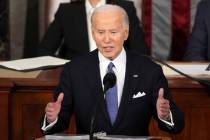War powers
In 1973 -- during the waning days of the decade-long undeclared war in Vietnam -- Congress approved the War Powers Resolution, often called the War Powers Act.
The motivation for attempting to draw a clearer line between congressional and presidential authority was clear. During the republic's first century and a half, it had been understood that the president was authorized to take the nation into a sizable overseas conflict only after Congress issued a formal Declaration of War, as it did within hours after the Japanese attack on Pearl Harbor.
But there had been no such declarations before the wars in Korea in the early 1950s, or in Vietnam.
The War Powers Resolution has never been formally invoked -- any more than there have been any subsequent Declarations of War -- despite the fact America has been involved in numerous armed conflicts with foreign powers over the past 35 years.
The Bush administration has claimed congressional approval for the Iraq war, for example, by virtue of an October 2002 resolution authorizing the use of force against Saddam Hussein -- passed overwhelmingly by Congress -- and regular approval of appropriations to fund the conflict since then.
War opponents have failed in past attempts to repeal or alter the original authorization, or to deny funding.
So, last year, Congress empaneled a bipartisan commission headed by two former secretaries of state -- James Baker and Warren Christopher -- to study how the 1973 Resolution is working ... or why it's not.
Presenting the commission's 68-page report on Tuesday, Mr. Baker said the commission's goal had been to preserve the powers of both the executive and legislative branches and "accomplish meaningful consultation" between them "before a decision to go to war."
The commission thus proposes a new joint House and Senate committee to include various bigwigs of both parties, assigned its own staff, with access to the highest classified intelligence.
The report calls for passage of a new War Powers Consultation Act early in the next Congress. The new act would require the president to consult with the new joint congressional committee before deploying troops to a "significant armed conflict" -- defined as lasting longer than one week -- and would mandate regular consultation thereafter. Response to a terrorist attack and covert actions would be exempted.
The new law would also require a congressional vote approving military action within 30 days of its inception. If approval is not given, any lawmaker would be authorized to introduce a "disapproval" resolution that would have to be voted on within five days. If that passed, the president would have to comply or veto the measure. If lawmakers could not override such a presidential veto, Congress's remaining option would be to deny funding.
Is anyone else snickering, at this point?
All this starts to sound like a broth cooked up by too many lawyers, or perhaps the overly arcane rules and secret handshakes of some tree-fort boys' club.
The Constitution gives no power to declare war to the president. It gives the power to declare war solely to the Congress. This was clearly intended to serve as a check on presidents seizing the power to bankrupt the nation and engender foreign animosity by pursuing overseas wars not vital to the national interest -- a famous tendency of the corrupt, hereditary European monarchs all too familiar to the founding fathers.
Asked about Iraq, former Secretary Christopher told The Washington Post Tuesday that Congress had authorized the Iraq war with "overwhelming votes," but the problem with such authorizations, is that after a war "has gone on for a while, members say, 'Well, we didn't mean that.' ... It comes down to questions of congressional will ... to resist funding or to limit it There is nothing we can do by statute that will change that."
Precisely. The congressional lawyers cannot compose a statute that will return to the malleable members the spine needed to do what their oaths of office and the Constitution require of them. The power of the purse allows the Congress to deny funding for any foreign adventure not backed by a Declaration of War. They can demand a vote on a Declaration -- and refuse funding for any foreign adventure not so authorized -- right now.
They fail to do so largely because the lawmakers want someone else -- the president and his men, generally -- to "take the blame" if things go badly.
No unwieldy new committee structure is going to restore to this gang of pettifogging finger-pointers the intestinal fortitude required to make the up-or-down decision on war -- and to live with the consequences.























